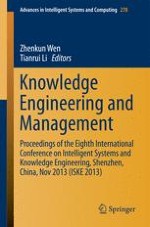2014 | OriginalPaper | Buchkapitel
Word Sense Disambiguation Using WordNet Semantic Knowledge
verfasst von : Ningning Gao, Wanli Zuo, Yaokang Dai, Wei Lv
Erschienen in: Knowledge Engineering and Management
Verlag: Springer Berlin Heidelberg
Aktivieren Sie unsere intelligente Suche, um passende Fachinhalte oder Patente zu finden.
Wählen Sie Textabschnitte aus um mit Künstlicher Intelligenz passenden Patente zu finden. powered by
Markieren Sie Textabschnitte, um KI-gestützt weitere passende Inhalte zu finden. powered by
